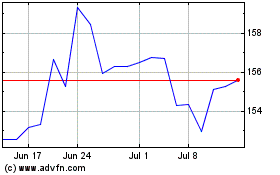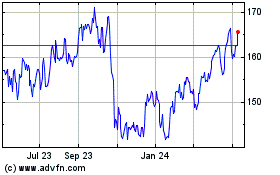Chevron Wins Ruling Blocking Enforcement of $9.5 Billion Ecuador Judgment
August 08 2016 - 4:30PM
Dow Jones News
A federal appeals court in Manhattan upheld a decision
preventing Ecuadorean plaintiffs from enforcing a
multibillion-dollar award against Chevron Corp., a significant win
for the oil giant in a legal dispute that has lasted decades.
Monday's decision affirms a lower-court ruling by U.S. District
Judge Lewis Kaplan, who found in 2014 that the $9.5 billion
environmental-damage judgment won by New York lawyer Steven
Donziger and his Ecuadorean plaintiffs against Chevron was obtained
through fraud and corruption. Judge Kaplan ruled Mr. Donziger
couldn't enforce the judgment in the U.S. or profit from the award
anywhere in the world.
Mr. Donziger has denied wrongdoing, and his lawyers appealed the
ruling on a variety of legal grounds. One of their central
arguments was that the federal anti-racketeering law Chevron used
to sue Mr. Donziger couldn't be used to obtain remedies other than
monetary damages, such as the judicial order from Judge Kaplan.
Mr. Donziger's lawyers also argued that Judge Kaplan's decision
not to recognize an Ecuadorean judgment could spark tension in
legal systems around the world. His lawyers said U.S. courts
shouldn't decide whether judgments from foreign courts are worthy
of enforcement.
On Monday, a panel of three appeals judges sided with Judge
Kaplan's 2014 ruling, finding that he did have the authority under
the anti-racketeering statute to bar Mr. Donziger from profiting
from the award.
R. Hewitt Pate, Chevron's general counsel, said Monday's
decision "leaves no doubt that the [Ecuadorean] judgment against
Chevron is the illegitimate and unenforceable product of
misconduct."
Monday's ruling is unlikely to mark the end of this legal saga,
one of the longest running in corporate history. The appeals judges
wrote that although the $9.5 billion judgment can't be enforced in
the U.S., their ruling does not stop the plaintiffs from taking
action to enforce the judgment elsewhere.
A spokeswoman for Mr. Donziger, Karen Hinton, said the legal
team is exploring all options for further appeal and will continue
to try to seize Chevron assets outside the U.S. For instance, the
sides are expected to go to trial in Canada over whether the award
can be recognized in that country.
If those efforts succeed, it remains an open question whether
the Ecuadorean plaintiffs can actually collect the money. In
response to arguments that Mr. Donziger's alleged misdeeds
shouldn't prevent the plaintiffs from enforcing the judgment, the
appeals court wrote: "There is no authority suggesting that a party
ignorant of its attorney's fraudulent actions may enforce a
fraudulently procured judgment."
Deepak Gupta, the lawyer representing Mr. Donziger on appeal,
called Monday's decision "unprecedented."
"Never before has a U.S. court allowed someone who lost a case
in another country to come to the U.S. to attack a foreign court's
damages award," he said.
The legal battle began more than 20 years ago. In 1993, Mr.
Donziger represented a group of Ecuadorean plaintiffs who sued
Texaco Inc., arguing that Texaco's oil drilling caused pollution
that sickened villagers in the Amazon rain forest. Chevron
inherited the lawsuit when it acquired Texaco in 2001.
A court in Ecuador awarded a record $19 billion judgment to the
plaintiffs, which was later scaled back to $9.5 billion. Chevron
has denied liability for the environmental damage and has not yet
paid any of the judgment.
Chevron struck back by suing Mr. Donziger in Manhattan federal
court, saying he fabricated evidence and committed fraud to obtain
the $9.5 billion award in Ecuador. Judge Kaplan ruled in Chevron's
favor in 2014.
Chevron has also filed claims against Ecuador in an
international tribunal under The Hague, accusing the country of
denying Chevron a fair trial. Those proceedings are still ongoing.
The appeals court in Manhattan said it didn't need to address the
"institutional adequacy of the [Ecuadorean] judicial system."
Analysts said Monday's ruling represents another signal to
investors that the case is moving in Chevron's favor. Previous
developments, either for or against the company, have failed to
move its share price, showing that investors don't anticipate it
having a material impact.
"The broader investment community is signaling that at the end
of the day, this will go away," said Brian Youngberg, an energy
analyst at Edward Jones. "Investors are assuming that ultimately,
Chevron will pay nothing."
Bradley Olson contributed to this article.
Write to Nicole Hong at nicole.hong@wsj.com
(END) Dow Jones Newswires
August 08, 2016 16:15 ET (20:15 GMT)
Copyright (c) 2016 Dow Jones & Company, Inc.
Chevron (NYSE:CVX)
Historical Stock Chart
From Mar 2024 to Apr 2024

Chevron (NYSE:CVX)
Historical Stock Chart
From Apr 2023 to Apr 2024
